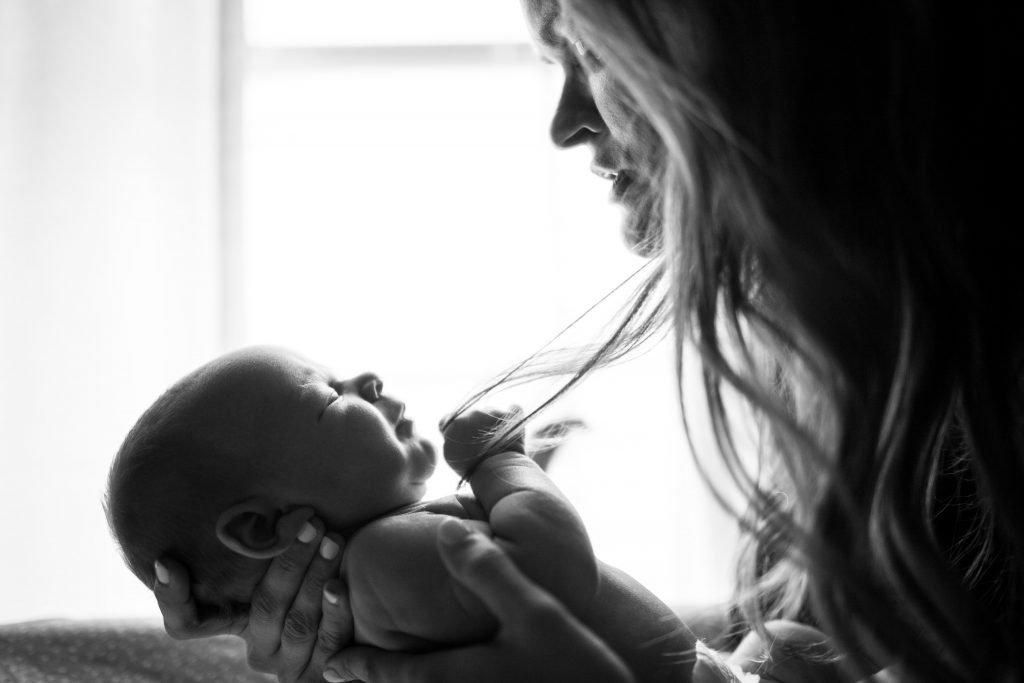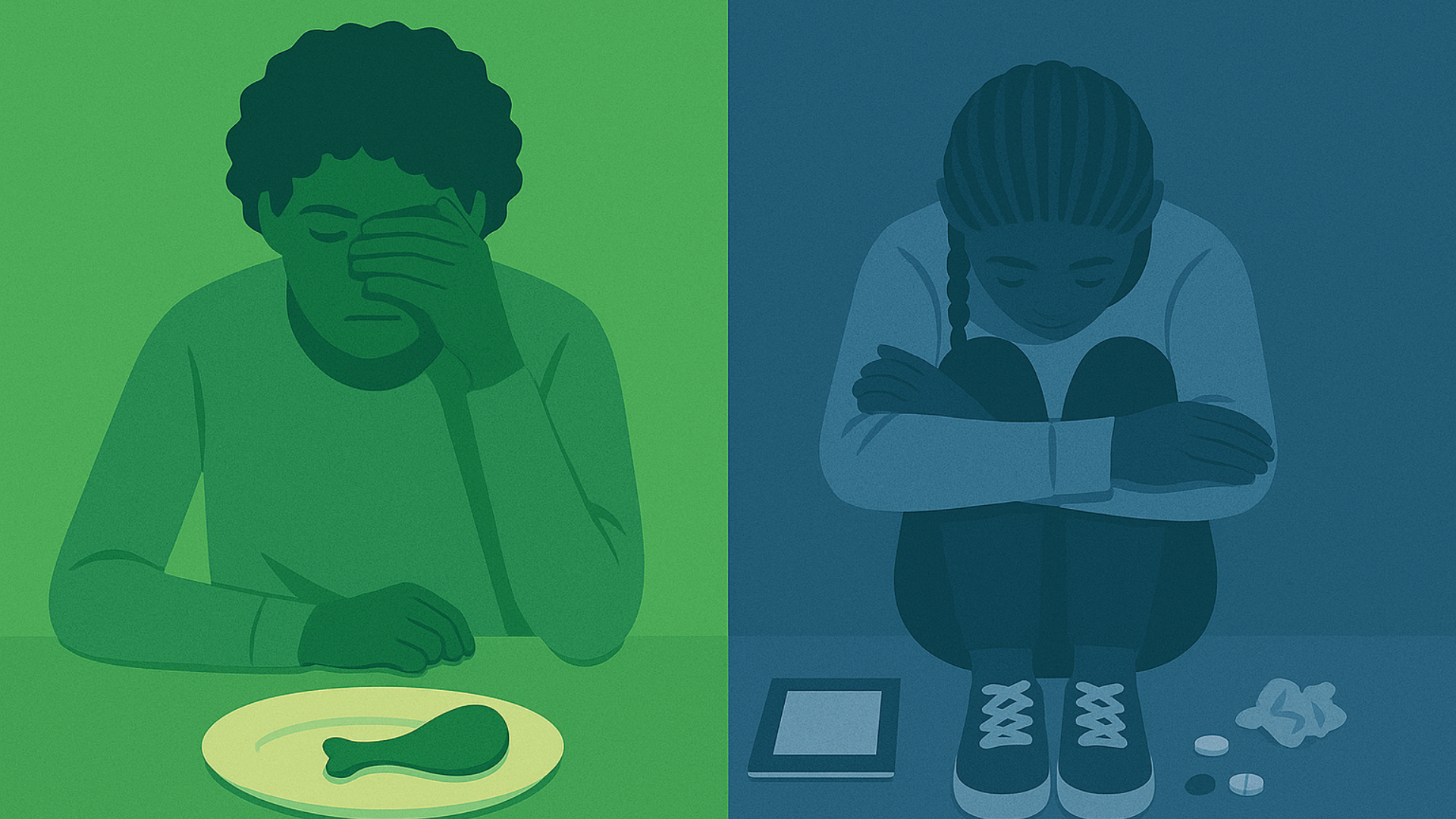Meghan’s Perinatal Mental Health Story

Going into my postpartum period, I never thought I would suffer from postpartum anxiety (PPA) or postpartum depression (PPD). Overall, I had a wonderful pregnancy and a supportive partner, and I was prepared in every way I could think of. I saw my primary care physician for a preconception check-up and went to every prenatal appointment being fully transparent of my medical history (which included anxiety, post-traumatic stress disorder (PTSD), and hypothyroidism). I built a strong support system and even had a prenatal therapy session.
My son was born healthy right on his due date. Despite developing an infection and having trouble sleeping in the hospital, I was feeling happy and healthy too. My son was doing well and slept a lot. I continued to have trouble sleeping once we were home. I had heard people describe having a ‘birth buzz’ after delivery, so I assumed that was what was going on.
At my son’s two-week appointment, he had gained back his birth weight plus some. This fueled my perfectionist desires and I told myself that I was rocking this whole “mom thing.” I informed our pediatrician that I was having trouble sleeping. We assumed the cause was anxiety and I promised her I would see my previous therapist. Unfortunately, she was booked out for three months. I thought I’d be fine to wait as I was comfortable dealing with anxiety.
Over the next weeks, things continued much in the same way. Still no sleep, but it didn’t seem to be affecting me. Then came my son’s two-month check-up where he came in underweight. This news amped up my PPA because I worried I would have to give up exclusively breastfeeding and I wanted my son to have the benefits of breastmilk. Also, I had found breastfeeding to be empowering in the same way pregnancy had been for me. I scheduled a lactation consultation and was advised to triple feed at each session. We did this for two weeks. I started dreading feeding because I was nervous about whether he was taking in enough. At our follow-up appointment, I got the news that shattered me — the triple feeding didn’t work. I was devastated. I felt like my body had failed me.
We saw our pediatrician and made a plan to switch to bottle feeding so we could track his intake. I started pumping and supplementing with formula or donor milk. I hated pumping. It was a constant reminder of what I had lost. Moreover, my baby had a hard time transitioning to a bottle.
During this time, I met with my doctor to rule out any medical issues as the cause of my low supply. I explained how I was having trouble sleeping and was waking up drenched in sweat, and that I was feeling anxious, irritable, and sensitive to light and sound, plus having heart palpitations. She assured me most of these were normal postpartum symptoms and hesitantly ordered labs. My results showed my thyroid was hyperactive. This explained why I had been energetic and was not sleeping. She adjusted my medication, but said it would take six to eight weeks to normalize. I requested a referral to endocrinology so I could see if this had affected my breastfeeding.
I couldn’t get into the endocrinologist for four months. During that time my PPA got worse. My baby had started his four-month sleep regression. He woke 10 – 20 times a night. I became obsessed with improving his sleep. I bought courses and watched videos. Nothing helped. A voice inside my head began to tell me I was failing. I knew it was a lie, but I started believing it. I told myself there must be something I’m doing wrong and obsessively started using Google to answer all my parenting questions. I became rigid about our baby’s feeding schedule and nap routine, afraid that swaying from it would derail any progress we were making.
I finally got to see my therapist, but I continued to get worse. I followed up with my doctor about my anxiety, but she only offered a prescription. I wasn’t ready to take medication due to my own stigmas about it. During this time, my PPD came forward. I had never experienced depression before and it terrified me. I became withdrawn despite feeling lonely, had trouble finding joy, felt overwhelmed, and numbed myself by listening to podcasts all day. I started having suicidal ideation. I would search “I regret having a baby” and “I miss my old life” over and over, only to have the SAMHSA hotline pop up.
At last, I got to meet with the endocrinologist. She confirmed my thyroid had played a part in my breastfeeding issues. Additionally, she informed me that what happened could have been prevented. Patients with known hypothyroidism should take extra thyroid medication during pregnancy. I drove home in tears. I was so angry that some of what was taking place could have been prevented.
I came to a turning point when I reached out to my OBGYN. She helped me put a plan together. She prescribed sertraline, developed a sleep plan that included diphenhydramine before bed, and referred me to Thrive Reno. They did an assessment with me to determine what level of care would be most appropriate, while also taking into account my family and work obligations as well as my insurance and financial restraints. For me, they recommended their ‘It Takes a Village’ Day Program for perinatal mental health.
Thrive Reno’s ‘It Takes a Village’ Day Program saved me. I gained a thorough understanding of my PPA and PPD diagnosis in their psychoeducation class. This allowed me to explain to my family what was going on as this was all new to us. I was able to get closure on what took place during my delivery and take comfort from others’ stories during our birth processing group. I gained a ton of new coping skills and was reminded of the importance of physical movement as well as fueling my body in a gentle, non-judgmental way. The empowerment group allowed me to start reclaiming my days and in my private therapy sessions, I was able to start defining a new version of myself. After two and a half months, I graduated from the program.
Now, I feel like I’m in the best mental health shape and I like the person I am more than ever. I learned many lessons on this journey and while I am glad it’s over, I’m happy for where it has brought me. I’m even wanting to have a second child in the future. I found healing with Thrive, art, and reading PPA and PPD recovery stories.
If I could tell my past self a few things they would be:
- Trust the process.
- Never stop advocating for yourself.
- Ask for help.
- Prioritize sleep.
- Manage your expectations.
- Create a backup plan for breastfeeding (not just birth).
- Don’t be scared to try medication. Sometimes our brains need a “recalibration” as one therapist put it.
- You can do hard things.
I’m so thankful for what our community has to offer and hope every new parent can get the support they need. Parenting is tough and it does take a village.
A note from Thrive
Thrive Reno’s “It Takes a Village” Perinatal Day Program and additional perinatal outpatient services cater to new parents struggling with their mental health. Through integrated care from our perinatal specialists, new parents will be empowered to confidently and joyfully embrace their roles. Reach out to us anytime to learn more.
The post Meghan’s Perinatal Mental Health Story first appeared on Thrive Wellness.








